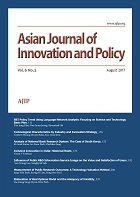 ISSN : 2287-1608
ISSN : 2287-1608
Job Competence of College Students in Korea: An Expansion of Core Competence Theory
Abstract
The purpose of this study is to find what competence determines the employment of college students using data from the K-CESA (Korea Collegiate Essential Skills Assessment) of a Korean university during 2009-2014. This test comprises of 6 categories of competence: self-management, global readiness, interpersonal relationship, resource/information/technology handling, communication and comprehensive reasoning. In addition to these competences, we add the comprehensive variable, grade point average. In order to identify the qualities of employment, employment was classified into 3 types: all employment, employment in decent jobs and employment in the top 500 companies. Results are as follows: For all employment and decent jobs, GPA and comprehensive reasoning were the meaningful variables. However in case of the top 500 companies, interpersonal relationship was added. Based on the analysis, this study suggests the fundamental concepts of college students’ job competence: job specific competence, job basic competence, and basic competence.
- keywords
- Competence, core competence, job competence, basic competence, job specific competence, job basic competence
Reference
Chae, C.G. and Kim, T.K. (2009) Studies on decision factor of college graduates’ employment, Journal of Vocational Education Study, 28(2), 89-107. (in Korean)
Chae, G.O. (2007) Studies on decision factor of college graduates’ employment and wage level, Korean Social Welfare Studies, 59(4), 35-61. (in Korean)
Cho, H.J., Ko, Y.M., Yoon, J.Y. and Shin, Y.M. (2014) Studies on effect of self efficacy of college student on core competence, The 1st K-CESA Utilized Collegiate Core Competence Symposium, 1-38. (in Korean)
Cho, J.S. (2011) Analysis on influence of student information on college graduates’ employment, Korean Data Information Science Journal, 22(5), 849-56. (in Korean)
Cho, Y.H., Kim, B.C. and Kim, B.J. (2008) Analysis on influence factor of college graduates’ employment outcome, Education Administration Study, 26(2), 437-462. (in Korean)
Choi, I.S. (2013) Experimental study on decision factor and employment of college graduates, Dankook University Graduation School PhD Thesis. (in Korean)
Chung, T.Y. and Lee, K.Y. (2005) Study on employment decision factor of college graduates, Management Education Study, 8(2), 159-84. (in Korean)
College A (2015) 2014 K-CESA Measuring Result Analysis. (in Korean)
Daily Hankook (2014) Change in Samsung Recruitment, Leads New Trend in Employment Market, 11.5.
Digital Times (2014) Job Seekers “Experience Burden on Qualification Transcen-dence”, 2.24.
DongA Newspaper (2014) Retirement Age is 60. Next Year… 72% of Conglomerates May Reduce New Recruits, 12.17.
Dubois, K.K. (1993) Competency-Based Performance Improvement: A Strategy for Organizational Change. Amherst, MA: HRD Press.
Economist (2014), Samsung Group Changes Recruitment Method for the First Time in 20 Years, Issue #1261, 11.17.
Hwang, Y.J. and Paik, B.B. (2008) Decision factor of college graduates’ labor market outcome, Journal of Employment and Skills Development, 11(2), 1-23. (in Korean)
Jin, M.S. (2013) Exploratory study on core competence difference of students in capital region and non-capital region, Education Sociology Study, 23(1), 105-27. (in Korean)
Jin, M.S., Son, Y.M. and Chu, H.J. (2011) Study on building measuring system of collegiate core competence, Journal of Vocational Education Study, 29(4), 461-86. (in Korean)
Kang, S. and Chun, E. (2014) Correlation between core competence of nursery majored students and their clinical nursing capability, The 1st K-CESA Utilized Collegiate Core Competence Symposium, 95-112. (in Korean) K-CESA Homepage, http://www. kcesa.re.kr
Kim, B. and Seo, H. (2013) Analysis on individual/college factor that influences graduates’ employment, Journal of economics and finance of education, 22(4), 243-68. (in Korean)
Kim, J.D. and Lee, E.K. (2014) Relationship between global competence and multi-culture awareness by multi-cultural experiences of college students, The 1st K-CESA Utilized Collegiate Core Competence Symposium, 65-94. (in Korean)
Kim, J.S. (2009) College graduates’ difference in activity of employment preparation and effect in job performance, Educational Science study, 40(1), 141-65. (in Korean)
Korea Employees Federation (2014) Result of 2014 New Employee Recruitment Condition Investigation. (in Korean)
Korea Employment Information Service (2013) Youth Job Guidance Program Manual. (in Korean)
Korean Educational Development Institute (2014) Education Statistics, Korean Education Statistic Service: http://kess.kedi.re.kr/index (in Korean)
Lee, C.G., Han, S.G. and Chung, H.S. (2013) Case study on development of competence oriented selection tool development, Journal of Employment and Skills Development, 16(3), 107-129. (in Korean)
Lee, E.K. and Kim, J.D. (2014) Relationship between college student’s personalities and K-CESA non-cognitive core competence, The 1st K-CESA Utilized Collegiate Core Competence Symposium, 113-138. (in Korean)
Lee, J.K. and Kim, J.H. (2012) Studies on correlation between college student’s core competence and study achievement., Journal of Vocational Education Study, 31(2), 227-46. (in Korean)
Lee, J.Y. (2002) Seeking competence centered strategy for career path development of college students, Counseling Study, 3(2), 419-38. (in Korean)
Lee, K.J. (2014) Correlation between admissions score of K-CESA results and College GPA, The 1st K-CESA Utilized Collegiate Core Competence Symposium, 155-176. (in Korean)
Lee, K.Y. and Kim, K.K. (2008) Decision factor of first job form of college graduates, Korean Educational Study, 14(3), 87-111. (in Korean)
Lee, Y.M., Lee, Y.Y. and Lim, J.Y. (2014) Decision factor studies on college students’ preferred job, Social Science Research, 53(1), 337-74. (in Korean)
Maeil Economy Newspaper (2015) Worst Employment Cliff Incoming for This Year’s College Graduates, 1.2.
McClelland, D.C. (1993) Testing for competency rather than for intelligence, American Psychologist, 28(1), 1-14.
McLagan, P.A. (1989) Models for HRD practice, Training and Development Journal, September, 43(9), 49-59.
Mirable, R. (1997) Everything you wanted to know about competency modeling, Training and Development, 51(8), 73-77.
MOE (2014) 2014 OECD Education Index Inquiry Announcement, MOE Press Release, 2014.9.9. (in Korean)
MOEL (2013) Core Competence Evaluation Model. (in Korean)
Money Today (2014), KorCham: Job Competence over Qualification... Companies Show Positive Response to ‘Core Competence Evaluation Model’, 12.15.
Moon, S.S., and Noh, S.W. (2013) Effects of college factors on employment outcome, Education Comprehensive Study, 11(3), 75-94. (in Korean)
- 100Downloaded
- 194Viewed
- 0KCI Citations
- 0WOS Citations

